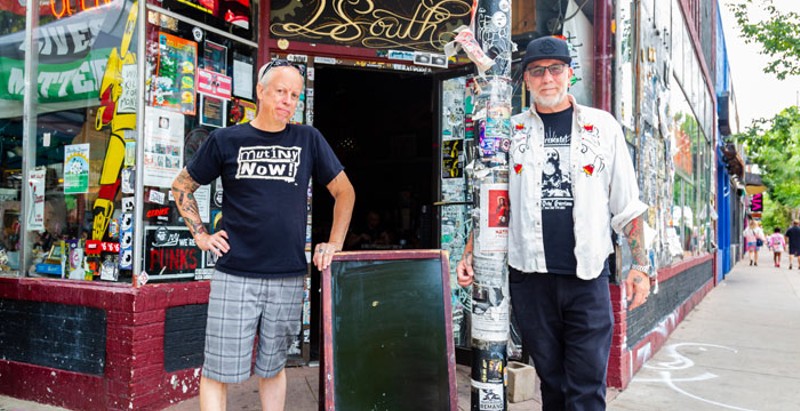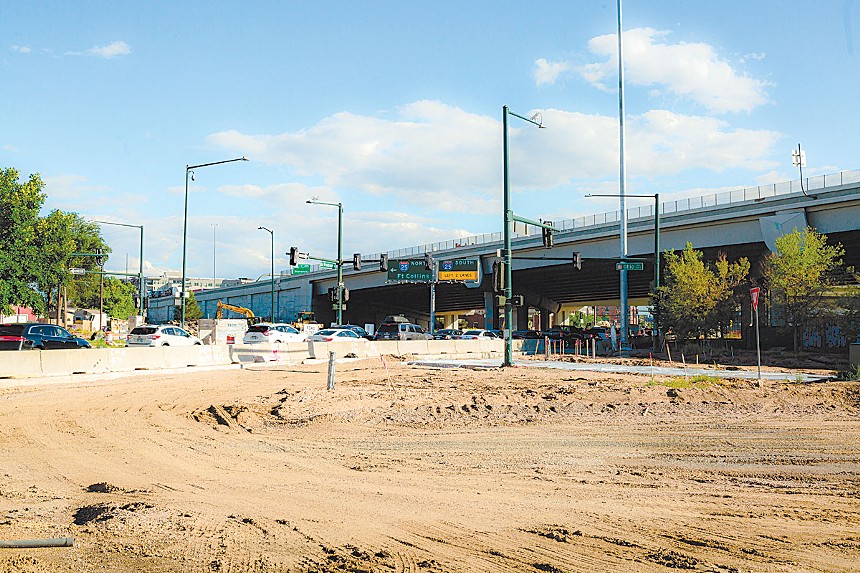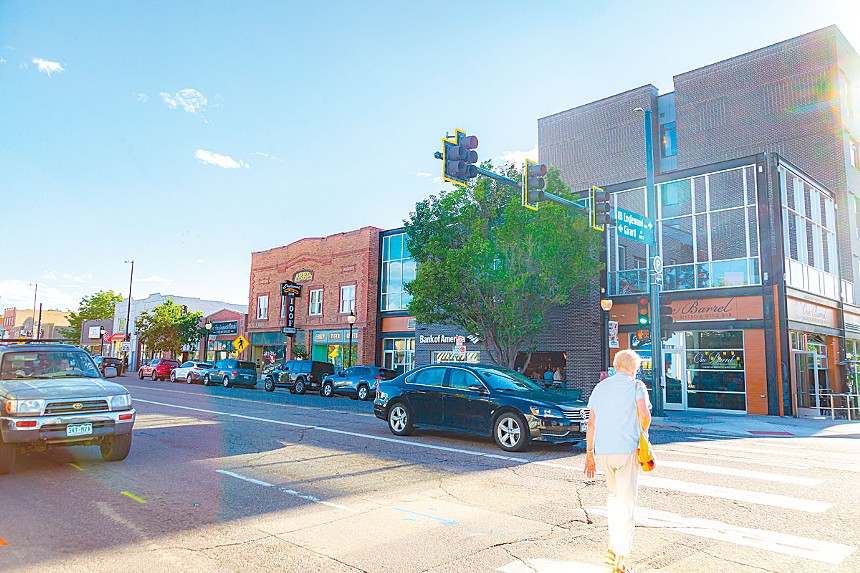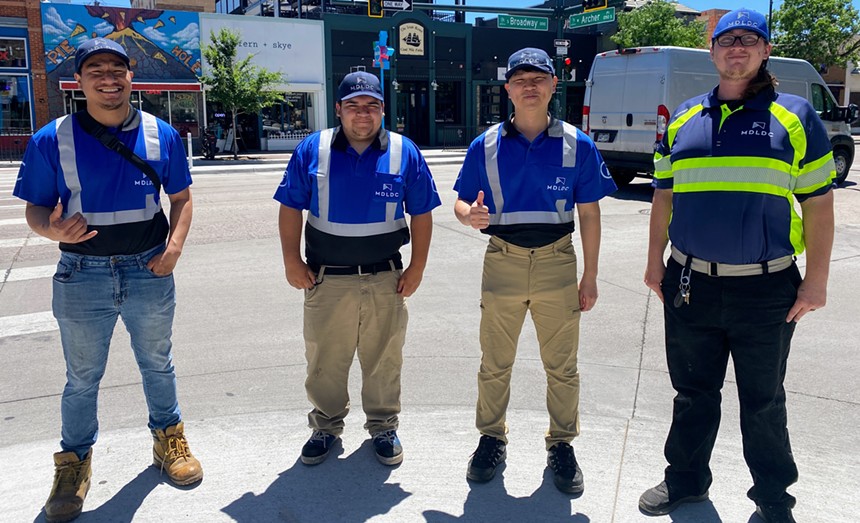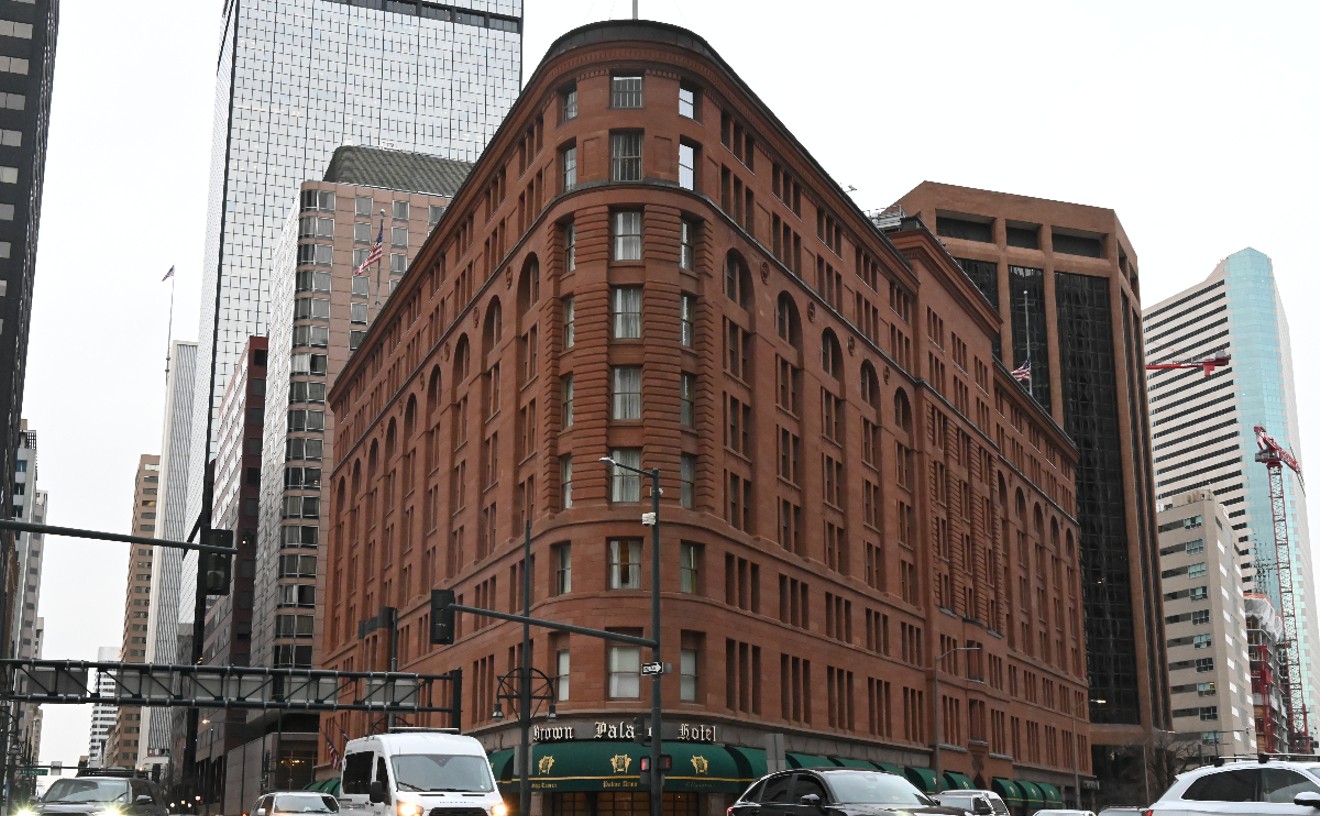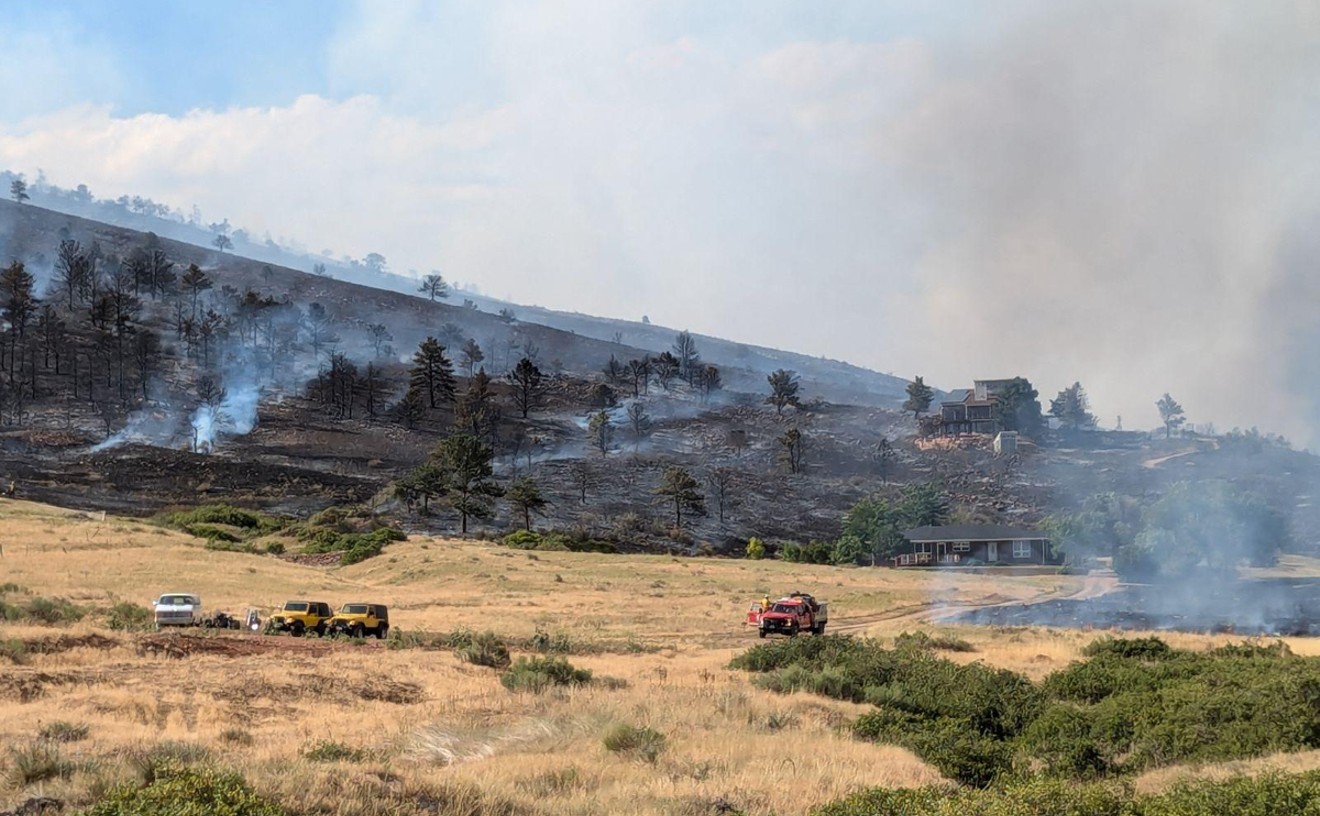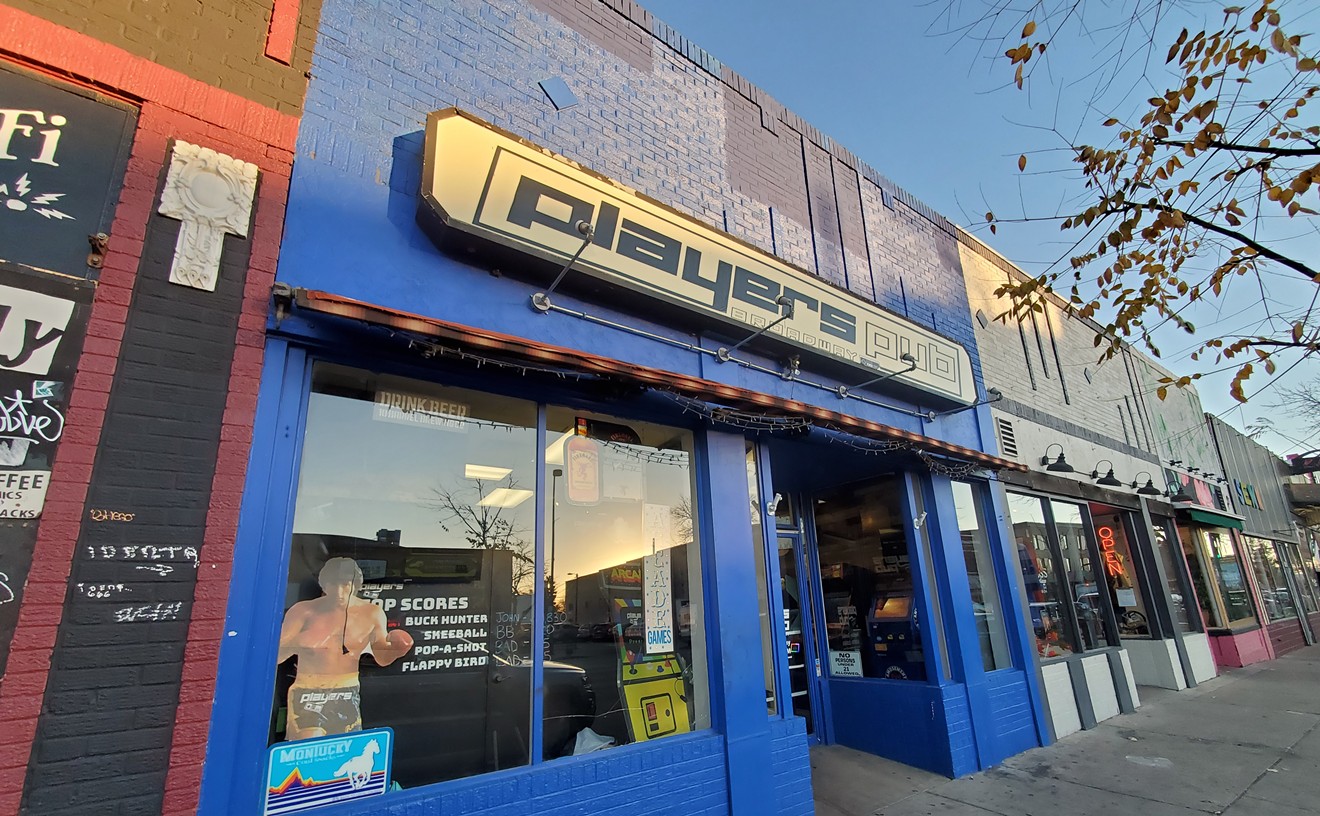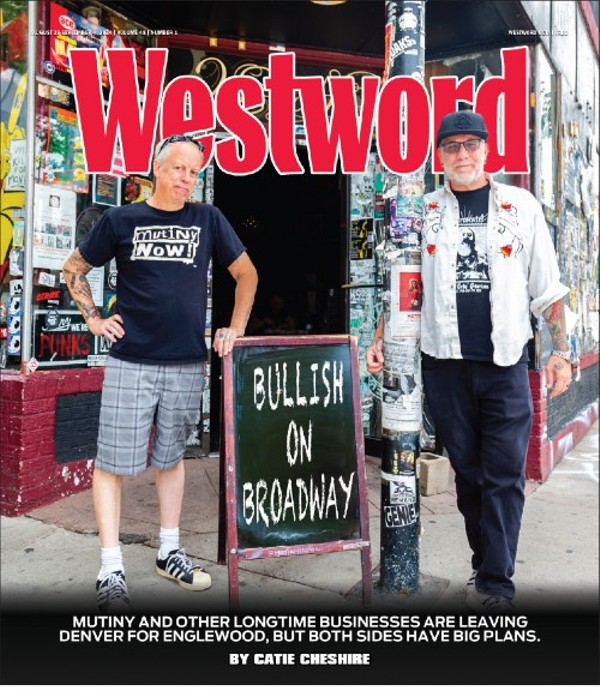Megyesi started chatting up the bartender, who mentioned that the space next door was available for rent. When Megyesi and co-owner Jim Norris went to check it out, it seemed like a perfect fit. After September 22, Mutiny will be moving down Broadway to Englewood, joining a block that’s already a destination for those seeking great local shops and restaurants.
“They have the same sense of idealism that Matt and I have had over the years,” Norris says of Mutiny’s new landlords. “The space itself has things that we've been missing, as far as just doing business.”
Those things that Mutiny was missing in Denver since opening in 2013? An air conditioner, a fully handicap-accessible bathroom, a drinking fountain and ample free parking across the street.
Norris and Megyesi’s story is similar to that of Fellow Traveler co-owner Joe Phillips, who was inspired to open on the block after grabbing a drink at a neighboring watering hole. According to Phillips, who co-owns the restaurant with Singkorn Dhawornvej and Kimberly Kutt, he realized the potential in the neighborhood while having a drink at the Englewood Grand, just down the street.
“I thought maybe we could be early adopters in this area, and that was the gamble we took,” says Phillips, a former bartender at Sputnik in Baker who is working to buy that bar now. “It has a lot of similarities to Baker ten, fifteen years ago, maybe even longer. We have a great theater in the Gothic, and we've got great restaurants and bars, and it's starting to become kind of an echo of north South Broadway.”
With textile craft store Fancy Tiger Crafts — which moved down Broadway to Englewood in January after operating in Baker for almost eighteen years — and Mutiny joining the block, that echo is only getting stronger. Still, despite the recent changes and business movement, there are plenty of people on Broadway who believe Baker still reigns supreme as a haven for local stores, restaurants and music venues.
“The number of independent small businesses on Broadway is quite a bit higher than most places in the city,” says Luke Johnson, president of the Broadway Merchants Association. “There is a really palpable sense of community down here that I think is missing from some other places in Denver.”
Decades of work went into attaining that sense of pride. Keeping Broadway great has been a concerted effort by that community over the years, one that could gain even more steam this year: Currently, business owners along the corridor are trying to form a business improvement district to deal with the modern challenges facing the street, including crime and grime.
Broadway's Evolution Since the 1970s
Since the late 1970s, the nonprofit Metro Denver Local Development Corporation (MDLDC) has kept Broadway physically clean, from Second Avenue south to I-25. The MDLDC originated as a collection of property owners and businesses along the street, and now serves Broadway, the Golden Triangle Creative District, the Santa Fe Business Improvement District and the Colfax Business Corridor.“It was born out of this grassroots need to improve the community,” says MDLDC president Anthony Gengaro, whose father was one of those original business owners. “There was a lot of seedy, negative public optics on Broadway. … It was associated with a part of town that you didn't really want to be in. Over time, this changed drastically.”
Along with the City of Denver and the Denver Department of Transportation and Infrastructure, the maintenance district secured capital improvements such as planters, trees, bike racks, benches and pedestrian safety measures for the street.
New concrete sidewalks and crosswalks were implemented. In 1978, the city designated the Baker neighborhood as a Neighborhood Revitalization District, making it eligible for federal grants and loans that also helped refresh the area. More bars and music-related businesses opened in the early 2000s, attracting new people and more foot traffic to the street.
The Underground Music Showcase made the blocks of South Broadway its permanent home in 2006, encapsulating the area's independent, punk vibe through local bands and artists. Complementing the UMS were full-time music venues and an investment from Denver's LGBTQ community, which also made a home on Broadway. Today, Broadway is still part of the Lavender Hill Cultural District, which honors gay history and community in the city.
Historic buildings like the First Avenue Hotel and Broadway Plaza were redeveloped into new uses for retail and office space. Phillips was a bartender at Sputnik, at 3 South Broadway, which he's now working to buy with former fellow bartender Spencer Madison. The bar is one of several still attracting an alternative crowd while building on the strong sense of community along the street. It's right next to the hi-dive, another beloved venue that serves up cheap beers and live music.
“It was pretty grand,” recalls Rick Carpenter, who owns a photography business on Alameda just off Broadway. “That was the place to come, and it was safe. It was super safe.”
Owning a business on Broadway has never been all smooth sailing and clear skies, but COVID-19 brought a marked shift to the small businesses there, Gengaro says. People couldn’t patronize their favorite businesses, and at the height of the pandemic, the number of visitors to Broadway dropped 75 percent from pre-COVID numbers in 2019.
“People were no longer watching the community,” Gengaro recalls. “The combination of COVID and the opioid crisis has undoubtedly led to many, many issues. The housing crisis on top of it provided the perfect storm for the unhoused crisis we have today. All of these things have led to this greater stress on our community. Yet we're still here fighting every day to keep the streets as clean, safe and beautiful as possible with the funding we have.”
New and popular concepts are still popping up on Broadway, among them BurnDown, which moved into its 476 South Broadway address in May 2023. Since then, the large bar, restaurant and live-music venue has been full of people enjoying its balcony and entertainment.
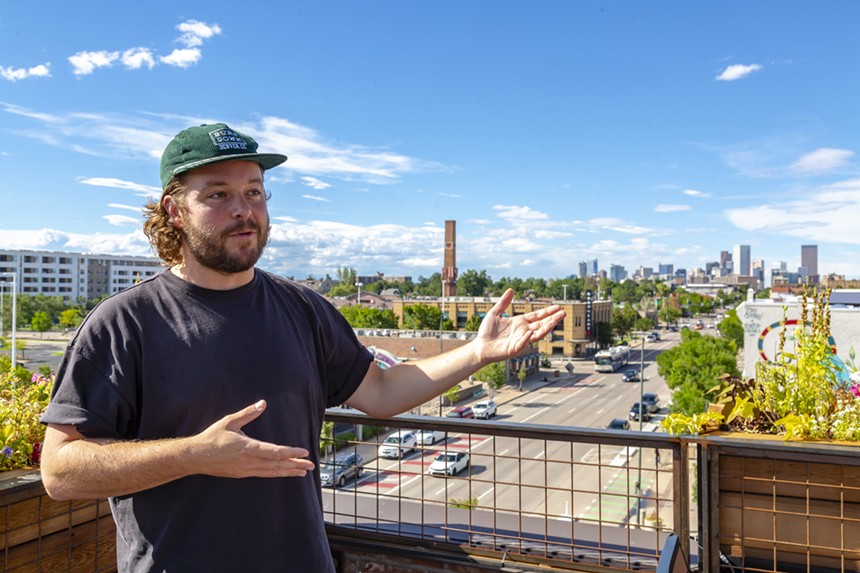
The BurnDown partners picked the venue's location because of the street's character.
Brandon Johnson
According to the partners behind BurnDown, they picked its location because of Broadway's character.
“It's kind of the first neighborhood I got to know and really fall in love with since we opened,” says managing partner Alex Vickers. “Our goal from the get-go was to set an anchor on Broadway, that part of Denver that kind of flies under the radar a little bit. … With the big space that we have here, we're able to help expand the draw — not just to BurnDown, but to all these other great bars and places that we love on Broadway.”
BurnDown is across the street from longtime Mexican restaurant Blue Bonnet, a juxtaposition that reflects Broadway's ability to retain its magical core while welcoming new energy. However, the current challenges facing the street are significant.
Gengaro says businesses and pedestrians are dealing with more vandalism and public drug use, urination and defecation than they have in the past. Plus, Broadway's infrastructure, largely built in the 1980s, needs upgrades. This has led to months of needed construction, another obstacle for small businesses to endure.
Safety and Construction Challenges on Broadway
The MDLDC removes around 600,000 pounds of waste from Broadway each year, according to the nonprofit. That includes hazardous materials such as razor blades, needles, defecation and vomit, and everything from cigarette butts to couches and shopping carts. In addition to waste, the MDLDC removed 15,000 instances of graffiti, stickers and adhesive posters in 2023, adding up to 720,000 square inches of material.The organization also reported 400 “advanced cases of behavioral misconduct” to 911 or Denver's 311 line in 2023. Gengaro says that rather than maintaining the district, the organization is just trying to scrub away the illegal activity.
“We used to have one individual go down Alameda, one individual go to the south and one individual go to the north. We were able to cover more distance and be more effective," he says. "Now we have to make sure that our people are running together into those areas because of safety concerns and security.”
Denver City Councilwoman Flor Alvidrez, whose district includes much of South Broadway, says it’s hard to hear about small businesses that are struggling — like the Electric Dream, which had a front door shattered by a belligerent man carrying a stick while an employee was inside in March.
“It's hard on my heart. It's hard on the community. It's hard on those small businesses that have to close their doors, obviously, more than anything,” Alvidrez says.
Between 2002 and 2023, the total number of open businesses from Sixth Avenue to I-25 dropped by 10.42 percent, while local businesses dropped by 11.58 percent, according to an MDLDC study conducted last year. National businesses increased by 9.3 percent, but local businesses still made up 78 percent of those on the street.
Major construction projects on the corridor, including a new bike lane and updates to the I-25 ramps, have made it trickier to navigate the street, as well. Business owners believe customers choose not to come to Broadway during construction.
Norris cites bike lane construction, which began in 2022 and lasted until April, as "the real hit" that made it hard to survive as a business there for Mutiny.
"It was a matter of survival to see who could last long enough, if you could outlast the bike lane being open," he says.
Norris adds that while business returned slightly after the bike lane was completed, it still hasn't been close to reaching pre-COVID levels. Additionally, Carpenter notes that the lack of connection to other bikeways in the city aside from the Cherry Creek Trail means the lane could be underutilized until the rest of the city's bike infrastructure is built out, which will take years.
“We need to isolate those bicyclists from traffic,” Carpenter says. “That was very important. I don't think it's getting used as much as they expected, for sure. One of the other things I see that's really problematic is there are still a lot of bicycles and scooters on the sidewalks.”
The bike lane also brought miles of four-sided cement islands that catch trash and sediment.
“We no longer are just sweeping the curbs along the storefront. We are now sweeping the curbs along the storefront, along the bike lane, between the islands, and the curb on the front of the parking lane, so we've effectually doubled our sweeping linear footage,” Gengaro says.
For the longtime Broadway business advocate, it’s just one example of how the city doesn’t always consider what small enterprises might be facing.
Most of the business owners Westword spoke with cited increased vagrancy and open drug use as operational problems for small businesses. They also wish the City of Denver would do more to help them financially during construction and pay closer attention to their challenges.
Mayor Mike Johnston has focused on revitalizing downtown Denver, but Broadway businesses in downtown's shadow say they have seen more unhoused individuals in 2024, and wonder if those people may have been pushed from downtown into Baker.
“Mayor Johnston has done some wonderful work at reducing the amount of large encampments on the street and transitioning folks into housing, but I think there's more work to do," Merchants Association president Johnson says. "We still struggle on Broadway with some of the petty theft and vandalism that we feel is solvable in time, especially if we had either safety ambassadors or a security patrol or something of that nature.”
The ongoing fentanyl crisis is something business owners feel the city is not well equipped to manage, either.
"Fentanyl has changed everything," Norris says. "The police and the city spend more time moving homeless people around than actually taking care of them."
Englewood: Smalltown Support Next to the Big City
On Englewood's stretch of Broadway, businesses worked with the city to form a Downtown Development Authority three years ago. While the DDA covers more than Englewood's historic main street area on Broadway, that stretch is a focus for the organization.Supporting businesses began with the basics of cleanliness and safety, DDA executive director Hilarie Portell says. Along with regular maintenance, the DDA has built a relationship with the police.
"For example, earlier this year, somebody was going around breaking windows, and it turns out that they were using landscape stone that was in one of the medians," Portell details. "We were able to just go in and remove the stones and put some new mulch down...and the police were able to track down the person who was doing that fairly quickly. But it's a constant thing. Everybody has to be vigilant."
The DDA developed a list of crime preventatives for businesses and has worked to ensure ample lighting at night as a deterrent. The DDA helps to keep the street clean, too: One of the organization's first actions was securing a Main Street Grant worth just under $150,000 from the Colorado Department of Transportation to revitalize the pedestrian crossings and raise medians on the 3400 stretch of South Broadway.
The mission is to ensure that Englewood businesses have the required support to flourish, and things are looking up on Broadway's 3400 block.
“What other block is like that in the Denver metro area?” asks Erika Zierke, who co-owns the Englewood Grand. “I can't think of any that has a vacuum repair store and a tobacco shop next to a high-end home goods store that's getting ready to open next door to us, and high-end hair salons and the best breakfast place in the Denver metro area.”
The Breakfast Queen has been serving classic diner breakfasts since 2005, and Anderson’s Vacuum has been around since 1947. Edward’s Pipe and Tobacco, Colorado Leather and Furs and Colorado’s Used Book Store all provide local shopping, too. Newer businesses such as Brewability — a brewery and restaurant that serves brews made by adults with disabilities — and Vietnamese restaurant Zomo, Mango Tree Coffee and the Tabletop Tap also contribute to the flavor of the block.
Along with Fancy Tiger, crafters can visit Treelotta and Blazing Star Yarn, while the Any and All Bikes shop serves cyclists in the area. Plus, the next block over boasts the original location of Rico’s Pizza and the vast, maze-like Army Surplus store and its next-door outlet. The list goes on, and it’s almost entirely made up of local, original places.
“What makes a neighborhood interesting is having a variety of businesses,” Zierke says. “Not all bars and restaurants, and not all shopping.”
Compared to the stretch of Broadway farther north, it's less expensive to operate a small business in this stretch of Englewood. Although there have been some instances of crime in the area, it is generally calmer where homelessness and open drug use are concerned, according to people who have worked in both spots.
“This area is definitely a lot more quiet at this point, but what's really exciting for us [is that] a lot of our old neighbors are moving down,” says Marta Johnson of Fancy Tiger, an employee-owned co-op. “That's just due to an increase in rent at the old locations, essentially. … Moving down here for us was really a financial decision, and we liked the neighborhood.”
Zierke agrees that high rent driven by corporate or out-of-town landlords has hurt Denver neighborhoods. On Englewood's 3400 block of South Broadway, most of the landlords are independent and local, which she believes helps keep the area full of character.
“When properties stay in local hands, residents and small businesses tend to do better,” says Zierke. “When you get landlords that are large corporations, that are national or international, even, they are no longer connected to the community, and so their motivation is what they see in terms of numbers on paper.”
Zierke and her husband, Phil, opened the Englewood Grand as a neighborhood bar with affordable craft cocktails eight years ago. She's now an Englewood DDA boardmember.
The authority can invest up to $70 million in the entire downtown district over the next thirty years, and improvements for existing businesses could be on the way. According to Portell, the DDA is looking into adding more trees and lighting on the street and examining current rules on patio, sidewalk and alley uses for businesses.
There's currently an artists' pop-up between the public parking lot for the 3400 block and the main street, where local multimedia artwork celebrates Englewood's claim as the home to the first multi-state flower delivery operation. The town's historic nickname, "Carnation City," born from its innovations with the flower, is also displayed.
Portell says it's important for Englewood's creative history to persist alongside historic aspects of downtown.
"That's what's so great about Englewood," she says. "It's 35,000 people. It's a small city right in the shadow of a big metropolis, and they've kind of done their own thing all these years. It's fun to be part of that; it's refreshing. It's easy to get things done in Englewood. They have really energetic, creative leadership."
Because Englewood is smaller, businesses report strong relationships with the local government, while it's easier to get lost in the shuffle in Denver.
“In Englewood, you just go down to the city center and you know who's going to sign your license for this or your appointment for that,” Phillips says. “It's really easy.”
Johnson remembers that when Fancy Tiger moved in, Englewood city officials came to visit within a few weeks of its opening. Norris says the city has already helped Mutiny settle in. During Fancy Tiger's first month, Fellow Traveler and Brewability both took lunch over to the new neighboring staff.
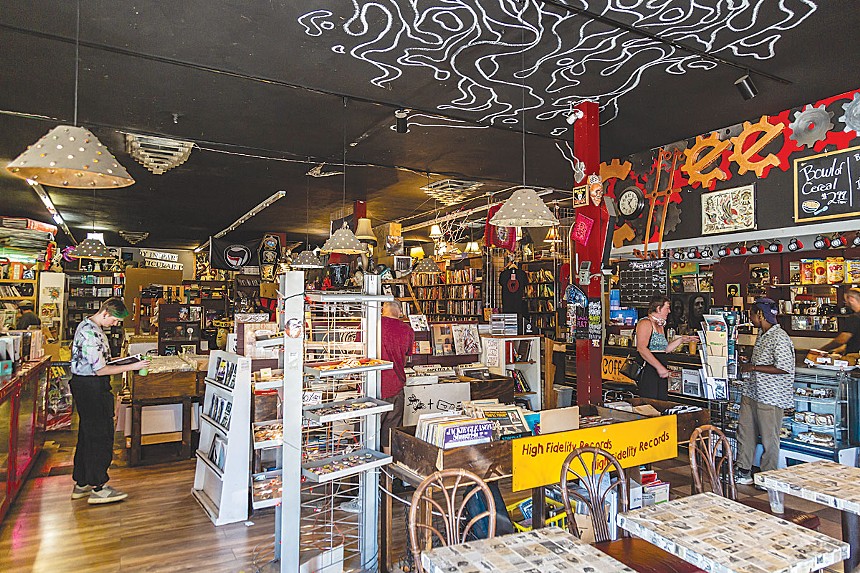
Although Mutiny Information Cafe is moving, the owners promise its spirit will remain the same.
Brandon Johnson
The Zierkes own a bar in Denver that is technically nameless at 2043 South University Boulevard, so they have experience with both cities.
“One of the things that I noticed about the difference between the two bars is that in Denver, we're sort of a standalone business,” Erika says. “In Englewood, we have a business community. All the businesses on that 3400 block welcome each other, promote each other. … That's just different than the experience that you get in a really large city like Denver.”
Still, these business owners know their section of Broadway has room for improvement.
“The growth has been slower than I anticipated,” Phillips admits. “We picked that space before COVID happened. … The change has been slow. There's some really great businesses on that block, but we still have empty storefronts on that block and the blocks before and after.”
Johnson notes that Fancy Tiger has seen less foot traffic at the new location. Plus, the co-op believes its address still being on Broadway makes it harder for shoppers to realize that it's moved. Continuing to add businesses like Mutiny to the area could help, suggests Johnson, who refers to Englewood's Broadway as the “Denver of yesteryear.”
Phillips calls losing Mutiny "a real hit" to Denver's section of Broadway, "but it's Englewood's gain." As a business owner on both stretches, he's confident that Broadway can and will stay weird, local and thriving across city lines.
Reason to Hope for Denver's Broadway?
Broadway business owners believe they’re close to creating a solution in the form of a new business improvement district that would cover the entire Broadway corridor in Denver. Luke Johnson says he has been working on it for around two years.“I feel bad for small-business owners. It's getting really hard to operate,” he says. “The only thing I can do is try and create a business improvement district that creates a safe enough space that people feel good about having a business on Broadway. The sad part is that we have to tax ourselves to do it, because the city should be keeping us safe. We shouldn't have to tax ourselves more to get things that the government should be offering us to begin with.”
But most businesses on Broadway appear willing to pay extra taxes if they're pooling together funds for extra security.
“That happens all over Denver," Johnson says of crime problems in commerce-heavy districts. "The difference with Broadway is we have a group of business owners and property owners that are close-knit enough that they're trying to do something about it."
According to Johnson, various groups involved in Broadway, including the MDLDC, can't make decisions and improvements for the entire stretch, as a BID would be able to do. Plus, those districts aren’t allowed to collect enough money to do anything beyond maintaining existing infrastructure, and Broadway needs more of both right now, he notes.
"There's no money for improvements or events," he says. "Some business owners would like to see security on Broadway. The idea is a business improvement district would be to address all of those other needs and wants."
Marketing for Broadway businesses would be part of the project, too. The boundaries aren’t completely set yet, either, as there is a push to include businesses on Lincoln from Sixth to I-25 in the district.
So far, Johnson says, most business owners like the idea and are only apprehensive about the cost. The group was able to raise around $100,000 needed for BID startup costs, however, so he believes there’s buy-in, particularly from those who are worried about security and decreased foot traffic.
The group has filed a letter of intent with the city and expects the BID will go to a vote in 2025. If the move is successful, several local maintenance districts along the street would be dissolved and absorbed into the BID, with the MDLDC overseeing maintenance. Johnson expects the Broadway BID will begin operating by January 1, 2026, collecting around $2 million annually from the businesses within its boundary as a percentage of assessed value on each building.
Johnson has a rough estimate of $1 per square foot per year for businesses, but notes that it can vary drastically from place to place. Right now, properties on Broadway are renting for about $30 to $45 per square foot, so the BID would be collecting a small percentage of that amount.
Alvidrez says her office is working to find other ways the city can support the area, including a request to fund a public bathroom for Broadway in 2023; the bathroom was stalled over concerns of creating a place for substance misuse, she says. The councilwoman wonders if something like the Assessment, Intake and Diversion Center — designed as a one-stop shop for homelessness resources at West 14th Avenue and Elati Street — would work on Broadway.
“We went to the AID Center. It really gave that environment of a cafe, where you could go and get ice, get water, get coffee and use the restroom,” Alvidrez says. “I think that's a really big service that we don't provide anymore.”
Alvidrez aid Mark Montoya says he has weekly calls with Denver police to learn about action on Broadway.
“Police officers are always giving us weekly data, monthly data, and it does seem that a lot of key trends are trending in the positive direction, meaning violent crime statistics are trending downward,” Montoya says. “Other crime statistics are trending downwards. At the same time, there is about a 28 percent uptick in substance-abuse-related crimes.”
While most of the data is positive, residents are still worried. Alvidrez says she takes those worries seriously and is on board with helping form a BID and advancing it to the election ballot next year.
It can't come soon enough for Johnson.
“Myself and [Gengaro] and other business owners have a vision of Broadway being a place that's got blooming flowers and budding trees and maybe holiday lights during the winter season," he says. "We want to get back to a place where anybody, even with a family, would feel comfortable being here on Broadway. Sometimes that's the case, but a lot of times, especially with an increased amount of folks who are struggling with addiction and on the street, it creates a tough environment to feel safe in sometimes."
Vickers, who helped create Broadway's recent success story at BurnDown, wants others to be able to experience the neighborhood he fell in love with when he moved to Denver. He sees efforts like forming a BID and working with other businesses as a way to preserve Broadway for the future.
"We don't want to turn it into something completely different," he says. "We want to just emphasize the great spots that are here."
Denver and Englewood may be two very different cities in terms of size and needs, but Broadway is still big enough for the both of them.

